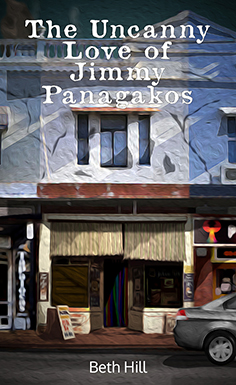This is a review of The Uncanny Love of Jimmy Panagakos, a novella by Beth Hill.
Reviewed by Ali Schnabel
A tale of the secrets and loneliness living in a Parramatta Road strip mall, Beth Hill’s The Uncanny Love of Jimmy Panagakos is a distillation of people, relationships and places forgotten to time. The elderly and withdrawn Jimmy Panagakos, owner of the derelict milk bar, refuses to sell to aspiring property developer George who owns the pawn shop a few doors down. George is keen to demolish the strip to make way for more profitable ventures. George’s seventeen year old daughter Ella is itching with a desire to escape the place she grew up in, yet also finds herself curious about the milk bar three doors down from her father’s pawn shop, and Jimmy’s odd relationship to it.
Hill distils not only the physical feel of the desolate area - “Nobody goes to Parramatta Road if they can help it” – but also the loneliness and frustrations of its inhabitants. Teenage Ella is “over life in this numb back garden” because “fuck all ever happened in her own life” and her disagreeable, unaware father George is sick of those who stand in the way of his grand plans, the “Fucking pinko bastards and their love for grit and grime and so-called history”. The language in The Uncanny Love of Jimmy Panagakos is down-to-earth, and channels the presumed lexicon of the disenfranchised inhabitants of Parramatta Road. Profanity abounds, but it never feels unnecessary. This, paired with familiar imagery of Australia throughout –the hills hoist, the dilapidated milk bar and its rainbow plastic screens, a steel milkshake cup– makes The Uncanny Love of Jimmy Panagakos feel like a genuinely Australian novella that isn’t trying too hard to access that vibe.
The titular love refers to Jimmy’s curious relationship with the milk bar, which he not only anthropomorphises extensively, but also engages in physical intercourse with (by masturbating in the back room, in case you were wondering). The purpose for such a bizarre central narrative is relatively opaque: Jimmy reconnects with the milk bar after the passing of his mother and brother, representing an attachment to same-ness, a resistance to change:
“With a loud clunk, she welcomed him in. A film of dust had settled upon her bright surfaces between Paul’s death and his own return. Jimmy eyed her disuse with an unexpected pleasure. Perhaps she had become more demure in his absence.”
Though Jimmy’s attachment is certainly bizarre, it’s not made completely impenetrable. He is presented to us as a lonely and misunderstood person, even from a young age. In a chapter from 1955, we see a young Jimmy obsessed with ‘Broomie’, a hand-held dustpan broom. He seeks comfort in Broomie – “Together they could sweep away the mess that was making Mama so sad. He brushed his hands through the black bristles for reassurance.” Jimmy is shown to us, then, as a man who struggles to identify with others or to engage with them on the same level as he does with his milk bar.
Not dissimilar to Jimmy’s connection to the milk bar, Ella feels a driving force pushing her away from Parramatta Road. To where, she’s not sure – but she is dominated by a strong need to escape. Just as stuck as Jimmy, however, are Ella’s Aunt Fi and her father George, who seem doomed to live out their depressing days on Parramatta Road. Hill achieves a lot with very little: dialogue is often short and clipped, but reveals much of what the characters are harbouring inside.
Certainly, the same could be said for the novella as a whole: The Uncanny Love of Jimmy Panagakos is a short, bittersweet examination of our attachment to fixed places, and how we anchor our feelings and behaviour based on those relationships.
The short format means that peripheral characters are intriguing, but given little page-time. A greater word count might have been devoted to exploring Jimmy’s inner workings, which at times seems to be somewhat unrealised at the cost of expanding the list of characters.
With the space it does have, however, The Uncanny Love of Jimmy Panagakos creates a rich and realistic portrayal of human attachment and the forms that it comes in; a central narrative about an elderly bloke having it off with his milk bar might seem odd, but Hill shows herself to be talented at painting subtle yet emotional portraits by pulling this feat off successfully.
This is a book review, part of a series where our writers check out some of the most exciting work being published around Australia and the world. To read more like this, click here.
To read an extract of the Uncanny Love of Jimmy Panagakos, click here.
Ali Schnabel
Ali Schnabel is a a writer from Melbourne, Australia. Her work mostly features in literary magazines that live under her dad's Playstation controller. @alivonschnabel


